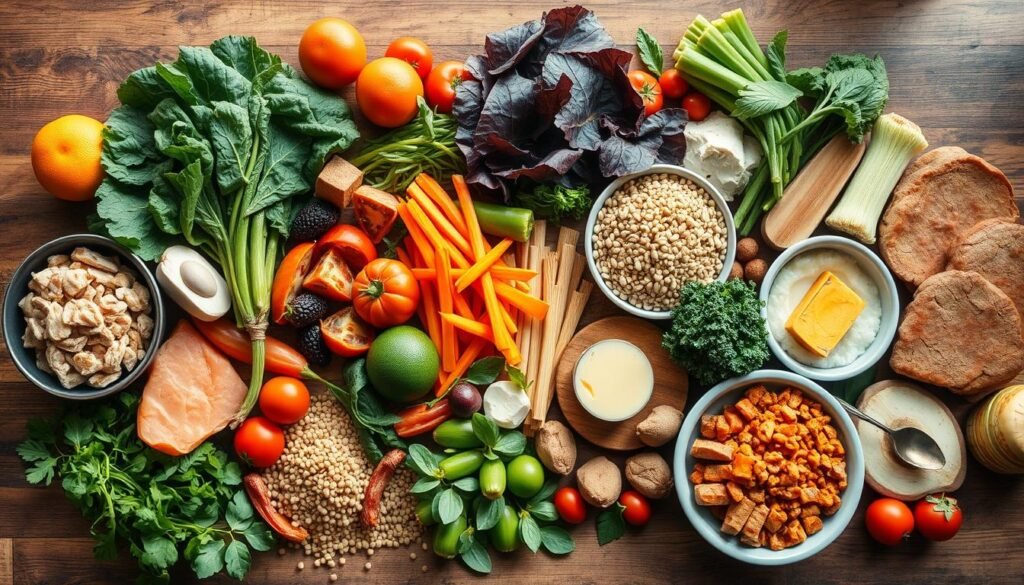Effective weight loss is possible with the right strategies and a long-term commitment. These guidelines help create lasting healthy habits. They focus on setting realistic goals, eating well, and staying active.
Tracking your progress, eating mindfully, controlling portions, and getting support are also key. These steps lead to better health and well-being.
Key Takeaways : Guidelines For Losing Weight
- Aim for gradual weight loss of 1-2 pounds per week through a calorie deficit of 500-750 calories per day.
- Losing just 5% of your current weight can significantly reduce the risk of chronic health conditions.
- Focus on a balanced diet rich in vegetables, fruits, whole grains, and lean proteins.
- Engage in regular physical activity, including both aerobic exercise and strength training.
- Develop sustainable lifestyle changes rather than relying on quick-fix solutions.
Guidelines For Losing Weight: Understanding The Fundamentals
Starting a weight loss journey means knowing the basics. It’s key to set realistic weight loss goals. Aim for losing 1-2 pounds a week. This pace lets your body adjust and avoids quick weight loss problems.
Also, getting mentally prepared is vital. Check if you’re ready for change and find your motivation. Overcome any emotional or psychological hurdles that might slow you down.
Creating a Sustainable Action Plan
Creating a lasting plan is essential for weight loss. Pick a nutritionally balanced diet that fits your taste and lifestyle. Include your favorite foods but do so in moderation. Focus on building healthy eating habits that you can keep up.
Also, a good plan covers both eating habits and physical activity. Aim for a balanced mix of exercise, like cardio and strength training. This helps support your weight loss goals.
“Losing weight is a journey, not a destination. Focus on building sustainable habits that will serve you well in the long run.”
By grasping the weight loss fundamentals, setting achievable goals, and making a detailed plan, you’re on the path to success.
Smart Nutrition Strategies for Effective Weight Loss

Successful weight loss isn’t just about cutting calories. It’s about eating a balanced diet full of nutrient-rich foods. Focus on colorful fruits, veggies, whole grains, and lean proteins. This way, you can make a lasting change in your eating habits.
Controlling your portions is key. Use everyday objects to gauge your food amounts. Cutting out sugary drinks and choosing water or unsweetened options can also help a lot.
| Food Category | Recommended Servings | Benefits |
|---|---|---|
| Fruits and Vegetables | 5-9 servings per day | High in fiber, vitamins, and minerals, low in calories |
| Whole Grains | 3-5 servings per day | Provide complex carbohydrates, fiber, and essential nutrients |
| Lean Proteins | 3-6 servings per day | Support muscle growth and maintenance, promote feelings of fullness |
| Healthy Fats | 2-3 servings per day | Provide essential fatty acids, aid in nutrient absorption |
Weight loss isn’t always straightforward. You might see quick weight loss followed by a plateau. Don’t get discouraged. Focus on lasting changes in your diet and lifestyle. Having support from loved ones or weight loss groups can help you stay on track.
By focusing on a balanced diet and portion control, you can achieve lasting weight loss. Add these nutrient-dense foods to your daily meals. You’ll see a big improvement in your health and well-being.
Physical Activity and Exercise Essentials

Regular exercise is key for losing weight. Mixing cardio workouts with strength training is best. It’s important to enjoy your routine so you can stick with it.
Cardio Exercises for Weight Loss
Cardio activities like brisk walking, cycling, or swimming burn calories. The U.S. Department of Health and Human Services says adults should do 150 minutes of moderate activity or 75 minutes of vigorous activity weekly. Activities like brisk walking raise your heart rate but still let you talk easily.
Vigorous activities, like running, make it harder to talk because they increase your heart rate a lot.
Strength Training Benefits
Strength training is also vital for losing weight and staying healthy. It builds muscle, which helps you burn more calories, even when you’re not moving. Aim to do strength exercises for major muscle groups two times a week. Use weights that make you tired after 12 to 15 reps.
Daily Movement Opportunities
Adding more movement to your day can also help with weight loss. Try taking the stairs, parking far away, or doing active hobbies. These small actions can add up and make you more active.
For successful weight loss, mix cardio workouts, strength training, and daily physical activity. Exercise regularly to reach your weight loss goals and stay healthy.
| Exercise Type | Recommended Weekly Duration | Example Activities | Calories Burned (160 lbs person) |
|---|---|---|---|
| Moderate-Intensity Cardio | 150 minutes | Brisk walking, light yard work, casual biking | 300-600 calories per hour |
| Vigorous-Intensity Cardio | 75 minutes | Running, swimming laps, competitive sports | 600-900 calories per hour |
| Strength Training | 2 days per week | Resistance exercises targeting major muscle groups | 90-270 calories per hour |
Building Healthy Habits and Lifestyle Changes

Getting to a healthy weight is more than just dieting or working out. It’s about creating habits and lifestyle changes that stick with you every day. Here are some tips to help you build a strong base for lasting weight control.
Mindful Eating is key to losing weight well. Enjoy each bite, noticing the flavors and textures. Eat slowly to feel full and stop eating too much. Don’t snack mindlessly or eat from containers, as it can lead to eating too much.
Stress Management is also crucial. Stress can make you eat more and mess with your hormones, making it hard to lose weight. Try meditation, yoga, or counseling to handle stress better.
Sleep Hygiene is important for weight control too. Aim for 7-9 hours of sleep each night. Poor sleep can mess with hunger and metabolism hormones. Make sure you sleep well by sticking to a routine and creating a cozy sleep space.
To keep these good habits, plan your meals ahead, buy healthy foods, and make a supportive environment. Be around people who want to lose weight too. They can help motivate and keep you accountable.
Building lasting habits and making lifestyle changes takes time and patience. Celebrate small wins, stay consistent, and be gentle with yourself. Focus on mindful eating, managing stress, and getting enough sleep. This will help you reach your weight loss goals and live a healthier life.
Tracking Progress and Maintaining Accountability
![]()
Starting a weight loss journey is a big commitment. It needs hard work and dedication. Keeping track of your weight, food, and exercise is key. It helps you see what’s working and what’s not.
Using apps, diaries, and other tools is very helpful. They keep you organized and aware of your habits. Logging your progress lets you celebrate wins and learn from losses. This keeps you motivated and focused.
It’s also important to stay accountable. Telling friends, family, or a group about your goals can help. Online communities and experts like nutritionists or trainers offer great support. They help you stay on track and reach your goals.
“Consistency is the key to unlocking your weight loss potential. Regularly tracking your progress and staying accountable to your goals will ensure a sustainable and successful journey.”
The weight loss journey has its ups and downs. But with the right tools and support, you can overcome them. By using weight tracking, food diaries, and progress monitoring, you’re on your way to a healthier life.
Celebrate your wins, learn from losses, and stay dedicated. With self-monitoring, accountability, and a positive attitude, you can make your weight loss dreams come true.
Overcoming Challenges and Staying Motivated

Reaching your weight loss goals isn’t always easy. You’ll face challenges that test your willpower. It’s key to have strategies to stay on track.
Breaking through a weight loss plateau can be tough. If you’re not losing weight, try changing your calorie intake or exercise routine. New workouts can shock your body and help you start losing weight again.
Keeping motivation up is also important. Set goals like wearing your favorite jeans or running longer. Celebrate small wins and imagine yourself successful. Change habits that hurt your progress, like eating too much while watching TV.
Social events and eating out can be tricky. Plan healthy snacks or check out menus before going out. Ask for meal changes politely. With a bit of creativity, you can enjoy yourself without losing your way.
Setbacks are part of the journey. The important thing is to get back up, learn, and keep going. Be patient, flexible, and kind to yourself. You’ll overcome any obstacle.
Conclusion
Successful weight loss is more than a quick fix. It’s a journey towards a lasting lifestyle change. By following the detailed tips in this article, you can reach your weight loss goals. This unlocks the long-term health benefits of a healthier lifestyle.
A balanced approach is key to lasting success. This includes smart nutrition, regular exercise, and changing your behavior. Small, consistent steps can lead to big results over time. Start with healthy habits, stay on track, and face challenges with determination.
The journey to sustainable weight loss is challenging, but the benefits are huge. You’ll feel more energetic, enjoy better overall health, and lower your risk of obesity-related diseases. Start this journey with a positive attitude. You’ll be on your way to achieving and keeping your weight loss goals for life.
Also Read : The Science Behind How Laughter Heals Your Health
FAQs
Q: What is the best way to lose weight healthily?
A: The best way to lose weight healthily is to focus on a balanced diet that includes plenty of fruits, vegetables, whole grains, and lean proteins while also being physically active. This approach helps to create a calorie deficit without sacrificing nutrient intake.
Q: How can I maintain weight loss after achieving my goals?
A: To maintain weight loss, aim to continue with the healthy lifestyle habits you developed during your weight-loss program. This includes eating healthy, staying physically active, and monitoring your weight regularly to help keep the weight off.
Q: What role does diet play in achieving a healthy weight?
A: Diet plays a crucial role in achieving a healthy weight as it directly influences your calorie intake. Eating fewer calories than you burn is essential for weight-loss, and focusing on a dietary plan low in added sugar and high in nutrients can promote healthy weight loss.
Q: Can people who lose weight quickly still keep it off?
A: While some people who lose weight quickly may initially keep it off, sustained weight loss is more likely achieved through gradual changes in diet and physical activity. It’s important to adopt a lifestyle that promotes healthy living rather than quick fixes.
Q: What are some effective ways to lose weight safely?
A: Effective ways to lose weight safely include setting realistic goals, engaging in regular physical activity, practicing portion control, and focusing on eating whole, nutrient-dense foods while limiting processed foods and added sugars.
Q: How does obesity affect my ability to lose weight?
A: Obesity can make it more challenging to lose weight due to factors such as metabolic changes and emotional eating patterns. However, with a structured weight-loss program and support, individuals can successfully achieve a healthy weight.
Q: How much exercise do I need to help some people lose weight?
A: Most health organizations recommend at least 150 minutes of moderate-intensity aerobic activity per week for weight management, along with strength training exercises on two or more days of the week to support healthy weight loss and maintenance.
Q: What dietary changes should I make to aim to lose 10 pounds?
A: To aim to lose 10 pounds, consider reducing your daily caloric intake by focusing on portion sizes, eliminating high-calorie snacks, increasing your intake of fruits and vegetables, and opting for whole grains over refined grains.
Q: What are some healthy lifestyle choices to promote weight management?
A: Healthy lifestyle choices for effective weight management include eating a balanced diet, staying physically active, getting enough sleep, managing stress levels, and staying hydrated, as these factors all contribute to a healthier weight.
Source Links
- https://www.mayoclinic.org/healthy-lifestyle/weight-loss/in-depth/weight-loss/art-20047752
- https://www.cdc.gov/healthy-weight-growth/losing-weight/index.html
- https://www.webmd.com/diet/features/the-abcs-of-weight-loss
- https://www.healthline.com/nutrition/how-to-lose-weight-as-fast-as-possible
- https://www.health.harvard.edu/topics/diet-and-weight-loss
- https://www.helpguide.org/wellness/weight-loss/how-to-lose-weight-and-keep-it-off
- https://www.cdc.gov/healthy-weight-growth/healthy-eating/index.html
- https://www.cdc.gov/healthy-weight-growth/physical-activity/index.html
- https://www.mayoclinic.org/healthy-lifestyle/weight-loss/in-depth/exercise/art-20050999
- https://www.mountsinai.org/health-library/special-topic/healthy-habits-for-weight-loss
- https://www.medicalnewstoday.com/articles/303409
- https://www.lifebridgehealth.org/blogs/weight-loss-journey-personal-responsibility-and-accountability
- https://pmc.ncbi.nlm.nih.gov/articles/PMC5568610/
- https://www.blenderbottle.com/blogs/health/strategies-for-success-how-to-monitor-adjust-your-fitness-journey?srsltid=AfmBOooUwfK8nUA22B5xiKt9SFt60kNrXtr-x9cYRr7402oVIqc1U3tn
- https://www.healthline.com/nutrition/weight-loss-motivation-tips
- https://www.nbcnews.com/better/health/how-overcome-common-obstacles-your-weight-loss-journey-ncna825311
- https://pmc.ncbi.nlm.nih.gov/articles/PMC4061651/
- https://pmc.ncbi.nlm.nih.gov/articles/PMC8017325/








Leave A Comment